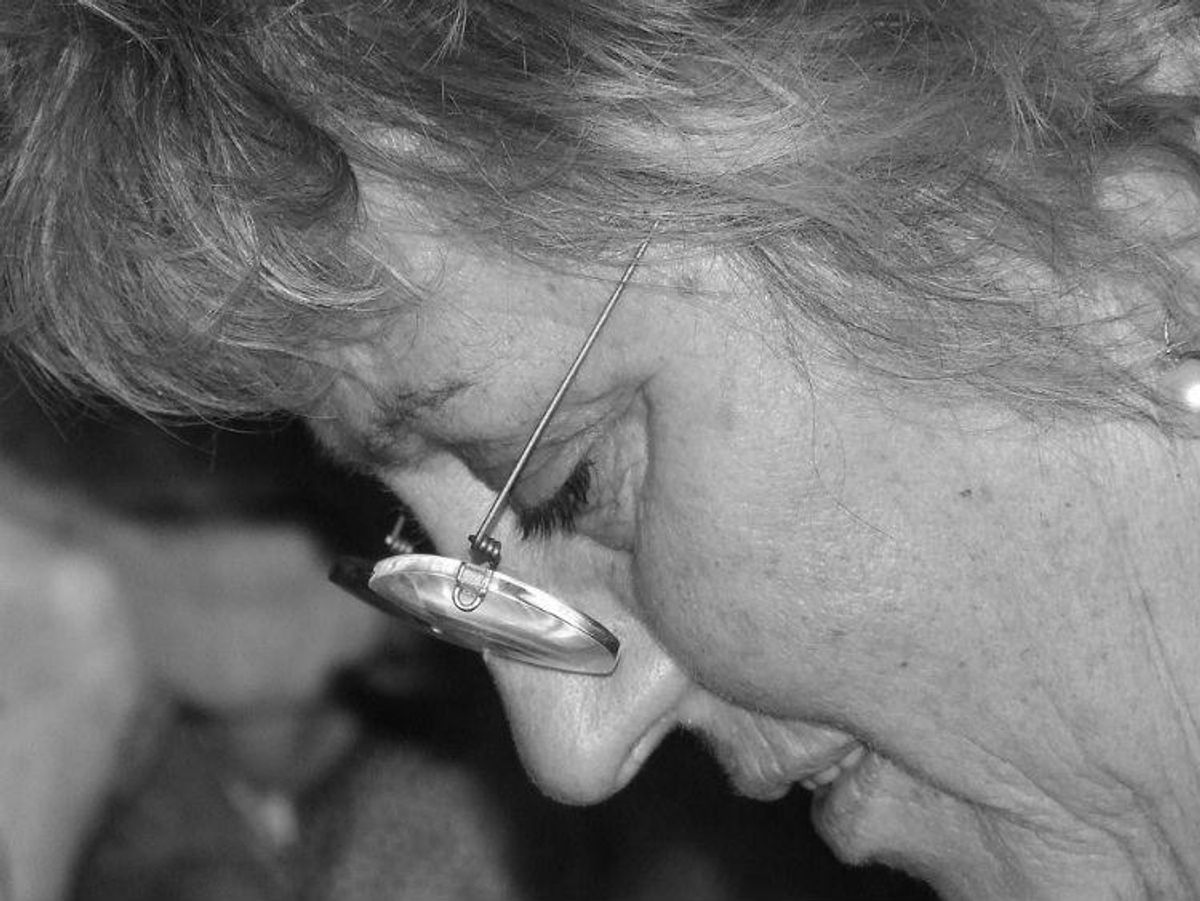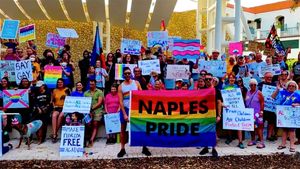In May of 2014, my friend Casey went to see Germaine Greer give a lecture in Winnipeg, Canada. Casey Plett wrote a Lambda Literary award-winning collection of short stories called A Safe Girl to Love, which Chelsea Manning was recently punished for reading in prison. Casey is trans, and Winnipeg is her most beloved city. I think it must have been a public silence that drove Casey to protest Greer's talk--silence on the topic of Greer's transphobia, silence from everyone but trans activists. Casey helped to organize a protest outside the talk. People asked why she wouldn't go in, to debate Greer. She told them the event was sold out. But when a guy from Canada's national TV station put a ticket in her hand, she figured--what the hell.
Why not ask Greer a question, woman to woman? And so Casey did. She got up during the Q&A and cited a piece Greer had written for The Guardian in 2009. That's where she called trans women "ghastly parodies." Greer claimed not to remember writing the piece. Casey brought up Greer's book The Whole Woman, in which she writes that trans women "do as rapists have always done." Greer didn't acknowledge that. Then she called Casey a misogynist. The crowd applauded.
Another trans woman, Trish Salah, author of Wanting in Arabic and likewise a Lambda Literary Award winner, rose to ask another question. Greer took one look at Trish Salah and said, "All the trans people I know are such exhibitionists! It's all about exhibitionism!" The moderator asked the two trans women to sit down. "Can we please have a different question?" the moderator asked. "On a different subject?"
It is fair for my friend Casey to ask a feminist public figure to address her remarks about a certain category of women. She deserves an answer, not the assertion that her question is inherently "highly misogynistic"--Greer's exact words--and thus forbidden. Trish Salah deserves an answer, not to be told to sit down and shut up simply on the basis of seeming recognizably trans.
And so, in the wake of the recent flurry of op-eds regarding the attempted no-platforming of Germaine Greer, at the University of Cardiff in the United Kingdom, I have to ask--the thinkpiece peanut gallery keeps talking about silencing. It keeps talking about censorship. But--whose silence? Who is censored? And by whom? (For those who are unfamiliar, the practice of no-platforming posits that it's best to refuse a place in the debate to people with discriminatory or violent agendas. The argument is that even offering them a platform dignifies their position in an unacceptable way.) In The New Statesman, Helen Lewis bemoans that she cannot write "anything other than a saccharine celebration of diversity, or solemn sermons about how brave trans people are." In The Spectator, Brendan O'Neill wonders, "Who died and made the jumped up Joe Stalins of student bureaucracy into the gods of what can be said?" Who indeed?
The practice of no-platforming within student unions isn't a familiar concept to many Americans. Basically, the National Union of Students is a British confederation of different student organizations. And that confederation has a list of people whom no student organization may allow to speak, because they feel that their ideas are repellant to the United Kingdom's community of students as a whole. This is a controversial strategy for dealing with ideas you don't like, but at the least, its logic is clear to me. The official NUS no-platform list is mainly populated by white nationalists and other people prone to rhetoric inciting violence. Greer is not on this list. She's not even on a smaller list of people that the Cardiff Student Union no-platforms. (To my knowledge, there is no such list.)
Here's what actually happened: Cardiff University's Women's Association had a conversation with its members about Greer's planned lecture on November 18, 2015. They decided they couldn't welcome Greer's unapologetic transphobia into their community. Bearing in mind the way that ideology like Greer's materially affects trans women--by limiting their health care options as a result of Janice Raymond's report to the American government on trans health care, by pushing trans women out of domestic violence shelters even though trans women are disproportionately affected by domestic violence--that choice makes sense. It is also worth mentioning that this is an issue of money. Greer doubtless demands a hefty fee to speak at an institution. The Cardiff University Women's Association seems not to want to line her pockets with money that might otherwise go towards what they view as more worthy goals.
Germaine Greer then wrote an op-ed for The Guardian, a U.K. newspaper read internationally, discussing how she'd been silenced and censored. Then she went on BBC Two, on a show called Newsnight, and she talked about how she'd been silenced and censored. In both of these outlets, she reiterated in even stronger terms her distaste for trans people. I won't quote her remarks. The inherent irony--that The Guardian and Newsnight are much larger platforms than the Cardiff Student Union--seems lost on Germaine Greer. The facts about free speech and censorship--that censorship is categorically the province of the state, which was not involved here, and that absolute free speech does not legally exist in the U.K.--seem lost on her too.
Did she give the talk? Briefly, she planned to cancel of her own volition, not wanting to face protestors. Then she changed her mind. The talk is on. Greer has not been no-platformed at Cardiff. She will give her lecture as planned.
Sara Ahmed, a feminist academic, wrote about a similar incident recently, in which a woman comic with anti-sex work feminist politics was protested at the Goldsmith's Student Union, and ended up canceling of her own volition. After her choice to cancel, a number of British feminists published a letter in The Guardian recapitulating the comic's anti-sex work ideas and bemoaning the "censorship" of feminists who are anti-trans and anti-sex work. Certainly, more people read this letter than would ever have seen the Goldsmith's Student Union Show. "These views...get expressed again as if they are being stifled," Ahmed writes. "They get repeated by being presented as prohibited." Later on in the same piece on her excellent blog, Feminist Killjoy, Ahmed observes, "the narrative of 'being silenced' has become a mechanism for enabling and distributing some forms of expression."
In 2015, Greer can only command a platform of this size by inciting a moral panic over "censorship." Indeed, this is the most I have heard about Greer since she was on Celebrity Big Brother. In other words, if you can go on TV to repeat your "censored" ideas, you are not being censored. You are not being silenced. You are louder than ever. So where does it come from, this unreasoning belief that cis feminists are in terrible danger from the evil trans woman thought police?
The foundational assumption of trans-exclusionary radical feminist ideology is that trans women are dangerous and violent, rapists simply by virtue of existing. "All transsexuals rape women's bodies," wrote Janice Raymond in the ideology's founding text, The Transsexual Empire. That's a belief Greer shares, based on her writing in The Whole Woman. (And her repeated refusal to disavow or update it.) The corollary to this assumption, of course, is that trans women must hold massive secret power to control the world from behind the scenes--because they are secretly men. There is no question that men rule the world, but the material reality does not tell us that trans women benefit from this. The material reality is that trans women are affected by misogyny amplified by transmisogyny. Trans women are at disproportionate risk for intimate partner violence, for sexual assault, for murder by violent men--all the evils Germaine Greer claims to deplore. When they happen to the right kind of woman, at least.
But the myth of the all-powerful cabal is a familiar myth about oppressed people. It evokes the insistence of the anti-Semite that there's some huge Jewish banker cabal behind all the evil in the world, or the racist grandfather grumbling that now that Obama's been elected, the blacks are in charge and ruining everything. Or the entitled men's rights activist in his basement, exhorting us all to take the red pill so we can finally understand how bloodsucking women control us all.
That's the barely hidden path of xenophobic ideology that got us here. We're all bemoaning the death of feminist free speech because someone with hateful views almost got her lecture cancelled, then didn't. And with no government involvement at all, only an organizing effort from young feminists. What about the women who decided they didn't want her presence to go unchallenged in their community? Where are their voices? What is their analysis? The think piece and op-ed machine responds with resounding silence. This is the silence that frightens me.
As for my friend Casey at Greer's lecture in Winnipeg--she did all the right things. She attended the event. She expressed her disagreement through peaceful protest. She asked a question. Did a robust debate ensue? You already know what happened. And after? The day after, Germaine Greer was interviewed sympathetically on national Canadian television by the very man who'd offered Casey a ticket into the lecture. "We got sympathetic press coverage the day before," Casey told me. "You can find it in both the Winnipeg Free Press and the Winnipeg Metro. But after this happened--nothing."
Stephen Ira writes poetry, essays, and fiction. He co-edits Vetch: A Magazine of Trans Poetry and Poetics. He lives in Iowa City, Iowa.

























































































Cooper Koch and twin bro spark controversy with eye-popping 'White Lotus' parody